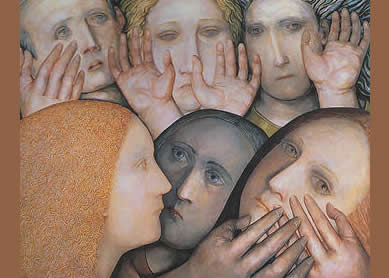“I waste away, I waste away!
Woe to me!
The treacherous betray!
With treachery the treacherous betray!”
Terror and pit and snare await you,
people of the earth.
Whoever flees at the sound of terror
will fall into a pit;
whoever climbs out of the pit
will be caught in a snare.
The floodgates of the heavens are opened,
the foundations of the earth shake.
The earth is broken up,
the earth is split asunder,
the earth is violently shaken.
The earth reels like a drunkard,
it sways like a hut in the wind;
so heavy upon it is the guilt of its rebellion
that it falls—never to rise again. (Isaiah 24:16b-20)
Does this about capture your emotions of the past week? If you’ve been feeling joyful and pleasant, how wonderful for you. I’m so happy. I’ve been riding a roller coaster of frustration at political headlines and the normal stress of work/home routines—so far not yielding to total despair, but I’ve definitely had moments of where I don’t like to admit that my first reaction is omg wtf. Alternative facts, dismantling of the ACA, executive order for border wall and immigration crackdown, omg wtf.
The thing is, before we had those cute txt acronyms, we had the Judeo-Christian tradition of lament. Lament gives you permission to complain to God—you pour your heart out directly to God. You can say stuff like:
How long, O Lord? Will you forget me forever?
How long will you hide your face from me?
How long must I wrestle with my thoughts
and day after day have sorrow in my heart?
How long will my enemy triumph over me? (Psalm 13: 1-2)You are always righteous, Lord,
when I bring a case before you.
Yet I would speak with you about your justice:
Why does the way of the wicked prosper?
Why do all the faithless live at ease?
You have planted them, and they have taken root;
they grow and bear fruit. (Jer. 12:1-2a)
Christian theologians and ethicists have written about the power of lament in naming suffering and assisting in the transformation of injustice. John Swinton, in his book Raging with Compassion: Pastoral Responses to the Problem of Evil, explains that the psalms of lament “provide a language and a structure within which pain, suffering, grief, and despair can be ritualized and worshippers moved from one way of seeing their situation to a radically different way of seeing.” Drawing on Walter Brueggemann, Swinton explains that, first, the lament provides definition to the situation; second, it provides a way to name what is hoped for. Liturgical lament then provides worshippers with an opportunity to protest injustice – in which Swinton says the one lamenting “rages against the injustice of the way that things are in the hope that the way things are is not the way they should be or will be.”
Swinton interprets the Psalm, quoted above, beginning with “How long, O Lord?” Some might say that this is written from a position of doubt. But Swinton says it isn’t.
“[The psalmist’s] question is not raged at a vague, unnamed God, but specifically at Yahweh, whose covenant promise has apparently been ruptured by the horrors of the psalmist’s experience. Lament is therefore not a mark of faithlessness but an act of faithfulness in situations where faith and hope are challenged.”
For readers today, recovering lament in our own context can help us to name anger while also preserving fidelity to tradition. Walter Brueggemann explains in The Message of the Psalms:
“[Lament] is an act of bold faith on the one hand, because it insists that the world must be experienced as it really is and not in some pretended way. On the other hand, it is bold because it insists that all such experiences of disorder are a proper subject for discourse with God. There is nothing out of bounds, nothing precluded or inappropriate. Everything properly belongs in this conversation of the heart. To withhold parts of life from that conversation is in fact to withhold part of life from the sovereignty of God. Thus these psalms make the important connection: everything must be brought to speech, and everything brought to speech must be addressed to God, who is the final reference for all life” (52).
Denise Ackermann, a Christian ethicist writing from the South African context, has long argued that western Christianity needs to recover an ability to lament, especially in Christian worship. For Ackermann, lament provides Christians with the opportunity to be honest about how suffering challenges our understanding of God. (See, for example, her essay “A Voice Was Heard in Ramah’: Feminist Theology of Praxis for Healing in South Africa,” in Liberating Faith Practices: Feminist Practical Theologies in Context; and her 1999 book review essay in Theology Today).
Do you feel pressured to “be positive” today when you are in fact angry? That’s what these theologians are writing about. Christians should have spaces—liturgically, interpersonally, and even in cyberspace—for naming the reality of pain and sadness in our lives without thinking that somehow this diminishes God or proves their lack of faith in God.
Prayer is a time to be honest with God about how you really feel. Maybe praying with the psalms this week can channel your outrage and rekindle your thirst for justice in an unjust world. If you’re looking for ideas, check out Psalm 22, 69, and 77. Or put the text away and speak from the heart.




